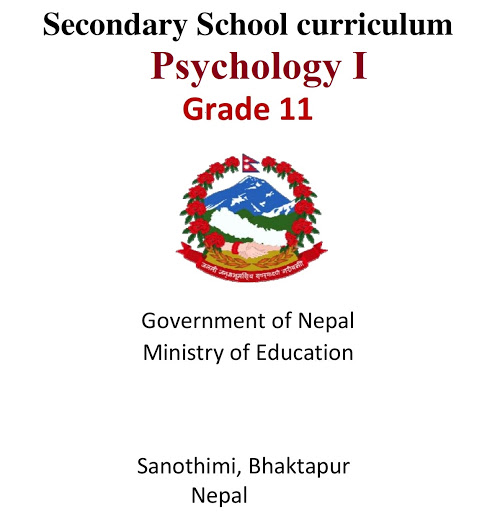Psychology I Syllabus is an introductory course in Psychology. The aim of this curriculum is to impart basic knowledge about the discipline among the students of psychology along with its application to daily life.
Disclaimer: This is the old syllabus of NEB.For 2076 Updated syllabus with PDF download option,visit: NEB 2076 Updated Syllabus
Psychology I Syllabus
GRADE XI
(Elements of Psychology)
Full marks: 100
Teaching hours: 150
I. Introduction
Psychology I Syllabus is an introductory course in Psychology. The aim of this curriculum is to impart basic knowledge about the discipline among the students of psychology along with its application to daily life. The curriculum attempts to provide an overview of the mental processes, determinants of behavior, common problematic areas of behavior and the societal adjustment within the constraints of the curriculum.
II. General Objectives
The general objectives of the Psychology I Syllabus courses are:
a. to make the learner understand the nature of psychology and its relationship with other social, physical and biological sciences.
b. to make the learner aware of the determinants of human behavior and provide him/ her the relevant concepts for adjustment in different social situations.
c. to plan for wholesome development of his/her own personality, and
d. to make they learn the application of psychology in different fields like education, industry and health.
III. Specific Objectives
On completion of the Psychology I Syllabus course the students will be able to:
1. explain the meaning, scope, and methods of psychology.
2. illustrate the bases of human behavior.
3. illustrate the perceptual process and factors affecting it, 4. explain the motivational and emotional aspects of behavior.
5. describe the types and process of learning and memory, and
6. describe the process or thinking, problem-solving and concept formation.
IV. Course Contents
Unit- 1 : Behavior and Its Bases (30 Teaching hours)
1. Psychology -definition, scope, and methods: experimental, case study and interview.
2. Physiological bases of behavior: central nervous system, peripheral nervous system, and endocrine system.
3. Environmental determinants of behavior, family, school, and neighborhood:
4. Deprivation-· nature and effects.
Unit-2: Perceiving the World (20 Teaching hours)
1. Sensory, attention and perceptual process:
2. Nature and span of attention, distraction, factors affection attention.
3. Perception- nature, laws of perceptual organization, shape perception, color perception, an illusion.
Unit-3: Dynamics of Behavior (15 Teaching hours)
1. Motivational and emotional aspects of behavior.
2. Concept of motivation, motivational cycle, needs, drives, and incentives’,
3. Emotional reactions-fear, anger, love.
4. James, Lange theory of emotion.
5. Canon-Boyd theory of Emotion
Unit-4: Learning and Memory (40 Teaching hours)
1. Concepts of learning and maturation learning curve:
2. Types of learning: trial and error, insight (cognitive learning, conditioning classical and instrumental) and their implications to education.
3. Transfer of learning – factors Influencing learning and transfer.
4. Memory: memory process- encoding, storage, retrieval;
5. Types of memory: short-term, long-term:
6. Measurement of retention: recall, recognition, saving, reconstruction:
7. Forgetting: nature, curve, theories-neural decay, storage failure, motivated forgetting;
8. Factors influencing memmy.
Unit-5: Thinking and Problem Solving (20 Teaching hours)
1. Problem Solving: concept, strategy, stages, factors affecting problem-solving
2. Concept formation: Types of concepts
3. Creative thinking: concept, developmental stages
Unit-6: Practical Work (30 Teaching hours)
A minimum of four experiments is required to be performed from the list given below. Only a simple mean (average) is to be calculated.
1. Effect of goal-setting on achievement. (Task- drawing human faces/materials-watch, 1-1)
2. Effect of set in perception. (Visual- Flower vase and two laces) 1 vase 1 flower
3. Effect of set in judgment (estimating/judging the coins size by drawing their picture, from distance subjects- boys and girls).
4. Effect of knowledge of results on performance. (multiplication task)
5. Measurement of error in Judgement. (Muller-Lyer illusion figure, self-made with the help of glaze paper).
V. Prescribed Text
To be written
VI. Reference Books
1. NCERT: Understanding Psychology of Human Behavior: New Delhi. India.
2. Hilgard, Atkinson, and Atkinson: Introduction to Psychology
3. S.M., Mohsin: Experimental Psychology
4. Collins and Driver: Experimental Psychology
5. s]Gb|o dgf]lj1fg ljefufM ;fdfGo dgf]lj1fg
6. kf7s, uf+uf, dgf]lj1fg s] xf] < jf;’zzL :d[lt k|sfzg
7. kf7s, u+uf, afndgf]lj1fg, jf;’zzL :d[lt k|sfzg
People who read this may also like to read
Or Download All NEB updated syllabus
